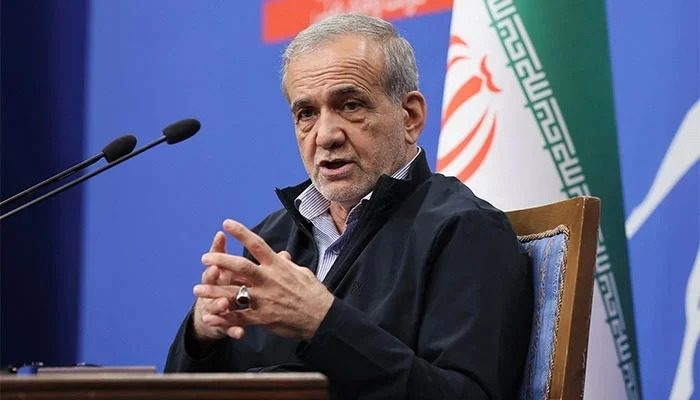Pezeshkian highlighted the stark contradiction in Trump’s rhetoric, where calls for peace abruptly shift to aggressive threats, revealing a deeply inconsistent approach

News Desk
TEHRAN: Iran’s president Masoud Pezeshkian has sent a clear message to the international community: Tehran does not seek war, despite ongoing threats and heightened tensions with the United States. Speaking candidly to international media, Pezeshkian criticized the erratic nature of Washington’s approach under President Donald Trump, highlighting the contradictory signals that have left Iran questioning the sincerity of US intentions.
Pezeshkian pointed out the stark inconsistency in Trump’s rhetoric, noting how the US leader often alternates between calls for peace and aggressive threats. “We don’t know which of the president’s statements to believe,” he said, reflecting the confusion and frustration in Tehran over Washington’s shifting posture. This ambivalence has clouded the fragile diplomatic efforts aimed at resolving one of the most contentious issues in global politics: Iran’s nuclear program.
The ongoing nuclear talks, which have seen numerous ups and downs over recent years, remain a crucial yet precarious lifeline in the fraught relationship between Tehran and Washington. While past negotiations, including the landmark 2015 Joint Comprehensive Plan of Action (JCPOA), had raised hopes of easing sanctions and curbing nuclear proliferation, those hopes were dashed when the US withdrew unilaterally in 2018 and reinstated harsh economic penalties.
Since then, tensions have escalated dramatically, with both sides exchanging accusations and engaging in proxy conflicts across the Middle East. Iran has been accused by the US and its allies of sponsoring militant groups and destabilizing regional security, while Tehran insists its nuclear ambitions are peaceful and its regional policies defensive. The backdrop of these disputes includes incidents like the US killing of Iranian General Qassem Soleimani in 2020, further souring relations.
Despite these deep-rooted conflicts, Pezeshkian’s comments underscore Iran’s cautious willingness to continue dialogue. He stressed that the Iranian government prefers diplomatic engagement over military confrontation, signalling a resolve to pursue negotiations even in the face of uncertainty and external pressures. This stance, however, exists against a complex web of mistrust, where every diplomatic gesture is scrutinized and met with suspicion on both sides.
The broader international community watches closely as these talks unfold, recognizing that the future of Iran-US relations carries profound implications not only for the Middle East but for global security. Pezeshkian’s remarks reflect the delicate balancing act Iran faces — asserting its sovereignty and regional influence while seeking to avoid the devastating costs of war.



